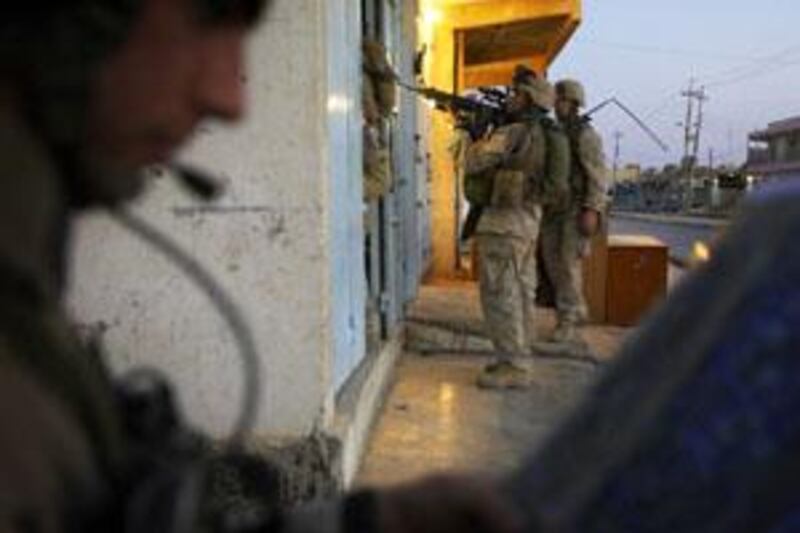BAGHDAD // The United States will reduce the number of troops in Iraq by around 12,000 in the next six months, the US military said today. The move is part of the American president Barack Obama's plan to end combat operations in August, 2010. "Two brigade combat teams who were scheduled to redeploy in the next six months, along with enabling forces such as logistics, engineers and intelligence, will not be replaced," the US military said in a statement. Reducing the number of US combat brigades in Iraq from 14 to 12 would cut the number of American troops, currently around 140,000, by 12,000, military officials said. Six years after the US-led invasion to oust Saddam Hussein, President Obama plans to pull all combat troops out of Iraq by Aug 31, 2010, leaving 35,000 to 50,000 support and training troops as Washington shifts its military focus to Afghanistan.
Last month, President Obama ordered 17,000 extra troops to Afghanistan to tackle a growing insurgency there. Under a US-Iraqi security pact negotiated by the former president George W Bush that took effect on Jan 1, the United States must withdraw all its troops from Iraq by the end of 2011. Maj Gen David Perkins, spokesman for US forces in Iraq, told a news conference that 4,000 British troops would also depart Iraq in coming months. The sectarian and insurgent violence that has claimed the lives of tens of thousands of Iraqis and more than 4,500 foreign troops since 2003 has fallen off sharply. But Iraq remains a dangerous place and insurgents continue to stage regular attacks in places such as the northern city of Mosul. Just hours before US officials announced the troop reduction plans, a suicide bomber killed 28 people as recruits gathered at a Baghdad police academy, the first large-scale attack in the capital in almost a month. Continuing violence raises questions about the readiness of Iraqi forces to take charge of security just a few months before better equipped and better trained US combat forces are due to withdraw from Iraqi cities. "We will reposition assets through the country ... based on the threat level," Maj Gen Perkins said. US forces across Iraq are increasingly focused on training local forces, whose ranks have swelled by hundreds of thousands since they were disbanded by US officials in 2003. While violence has dropped, Iraq still faces grave threats to its stability, including deep divisions over power and resources that have often pitted the Iraqi prime minister Nuri al Maliki against political rivals. Such rifts could be exacerbated as Iraq gears up for national elections scheduled for December. The US defence secretary Robert Gates has suggested the United States should be prepared to maintain a "modest" military presence to assist Iraqi forces beyond 2011 if asked to do so by Iraq's government. But the Iraqi government spokesman Ali al-Dabbagh, speaking alongside US officials on Sunday, appeared to rule out that possibility. "The Iraqi government has no intention to accept the presence of foreign troops after 2011," he said. *Reuters





